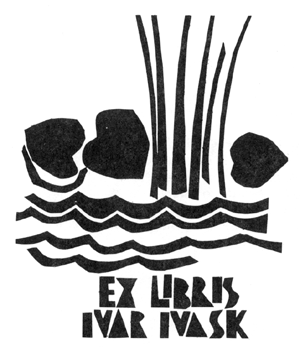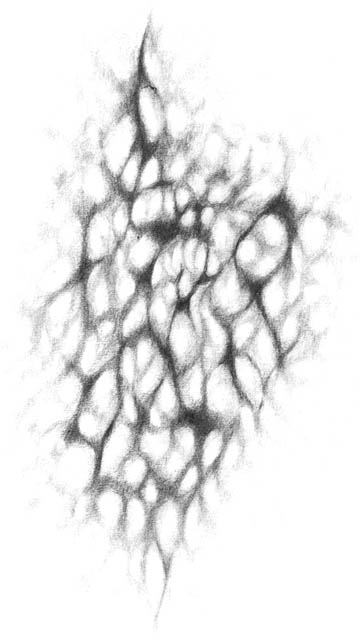Editor of this issue: Antanas Klimas
Copyright © 1977 LITUANUS Foundation, Inc.

|
LITUANUS
LITHUANIAN QUARTERLY JOURNAL OF ARTS AND SCIENCES
Volume 23, No.4 - Winter 1977
Editor of this issue: Antanas Klimas ISSN 0024-5089
Copyright © 1977 LITUANUS Foundation, Inc. |

|

VYTAUTAS VIRKAU, 1974
FOUR POEMS FROM THE ESTONIAN
by Ivar Ivask
*
One day all of us will be translated
yes even from the Estonian
the most difficult verse forms
will not deter eager Americans
looking for something new
always something new
pioneers discoverers defenders
thanks to their enthusiasm
one day we will become song
in Shakespeare's tongue
don't give up friend write
write poetry till you too
will be translated
into Whitman's language
and you can peacefully
give up your ethnic ghost
between the hard covers
of a fat American anthology
Translated by Astrid Ivask and the author
*
/ have always liked to look at water
down to the deepest rock
in a glimmer of refracted rays
under clouded sadness
seagulls
leaving their plaintive cries
to the waves
to me
a curving promontory
a path
between one blinding darkness
and the next
*
Foliage foliage
autumn wind constellations
clarify nothing for me
nothing changes but shrill voices
punctuate unspoken sentences
unfold on the wind
carry strangely
hourly for the owl
the years unfurl
but it does not count
fish-like the soul
slips into the coolness of fall
(from October in Oklahoma,l973)
*
/ am the shepherd of the heavenly flock
a white infinity of sheep is below me
what sheared curly hills of wool
I am a humble and quiet spirit
on the snowfield of the endless North
a flaming blue sword
leaves my hand a swan
with the fingers my limbs
abandon me
I descend to the eternal snows
to brood on the world's egg
/ lean against the pale shell of the visible
holding on to the North Pole
giving up the ghost
I sway in the space of space
icier than an ice floe
I run back into myself
fleeing from the radiant peak
on which vision
fades into invisibility
no one can deny me
to vanish into my own tongue
a seed of seeds
(from Gardens of History, 1970)
Translated by Astrid Ivask and the author
FOUR POEMS FROM THE LATVIAN
by Juris Kronbergs and Gunars Salins
Juris Kronbergs
be calm, don't rush
be calm, digest yourself slowly
digest yourself thoroughly, carefully, with understanding
with understanding, that is important
because no one else will do it for you
digest yourself all
spare only your skeleton and your eyebrows
because your skeleton holds you together
and with your eyebrows you express astonishment
Gunars Salins
SONG
In the cold my voice grew hoarse
and one day my song
was frozen solid.
I drank hot milk and honey
and recited a single prayer:
for the song to return if only like
he moos of cows or bees' buzzing.
Then it happened: in the night, when all
who tended me were gone,
from the waterfront slaughterhouses
attle broke onto the streets.
Thirsty, they mooed the city full. Galloping,
with their hot breaths and bodies
they melted the snow from windows and trees,
from skyscrapers and squares.
I pushed open the window a scream
thawed my voice. From it, as from a river,
cows were drinking at noon. Soaking
their warm udders in my song -
their warm udders in my song.
Translated from the Latvian by
Laris Salins
Gunars Salins
AT A HAPPENING
As if a temple.
As if a communion.
As if the eve of the flood.
But over the loudspeaker come stock reports, weather
forecasts ("Mostly sunny . . ."), lectures on
horticulture,
and a red-haired woman in a bathrobe,
her legs dangling over the balcony rail,
plays the cello -
or is it her legs?
And two young people in the corner play ping pong.
In the meantime
God has stepped out by the altar
and indeed is building
the flood -
blue waves, green waves -
higher,
higher,
higher,
higher . . .
The youngsters stop their ping pong match
and switch to
pachisi.
On my right a Pakistani or Indian woman with beautiful skin
asks for the time
or a safety pin.
I show her the in-
ide of my fin,
but the cellist starts on an Irish spin.
God glances over his shoulder,
disgusted
dismantles the waves
and takes them back to the flood warehouse.
Suddenly someone rises and shouts:
"Stop these antics -
liberate the captive nations!"
What? Was it me who shouted? Sweating
I collapse in my seat. "Oh, / see -
you, too, have a part in this mystery,"
marvels the Pakistani woman
with that beautiful skin.
And over the loudspeaker stock reports, weather forecasts. But then
I see: at last
demonstrations have begun. People come
with posters. No, with totem poles down the aisles
come the vanquished Indian tribes,
the ancient Incas along their rope bridges,
and the ancient Jatvingians, ancient Galindians, ancient
Old Prussians and
dinosaurs, labidosaurs,
alosaurs, trachonons,
diplodoci, triceratops,
tyrannosaurus rex -
they come in procession
with the Jatvingians, with the Galindians, with the Old
Prussians
('It's kind of fun to be extinct,"
a ghastly diplodocus whispers in my ear) -
and they disappear where God disappeared.
And over the loudspeaker stock reports, weather
forecasts, lectures on horticulture.
From the cello, from the balcony rail
cries of fishes, laughter of earthworms, twittering of
snakes.
And the Pakistani woman walks around and distributes
forgiveness of sins? mercy? the flesh of God?
I sense
through my leg, through my shin-bone someone is ringing
me
(as if by telephone) and then at my ear I hear
a dreaming skull -
waters mix with sounds,
fire mixes with rocks,
hills with the sun, with the moon, with the stars,
plants with the air
A dreaming skull
Translated from the Latvian by the author
Note: "It's kind of fun . . ." quotation from Ogden Nash's poem "Next!" in The Private Dining Room and Other New Verses.
Gunars Salins
TO MOONCITIES IN THE OCEAN AND NOAH'S WIFE
(for Janis Strods)
NIGHT. We're by the ocean. And there
on the waves like on rolling vineyard slopes
mooncities are born
and dazzling as if in flashes of shattering fate
they rush toward us, toward the shore and disappear
into the darkness, the sand, ourselves.
Ah, Noah's wife,
when the flood came, you didn't desire to be saved
with your hundred year old husband, but to stay in those
cities
that dazzling disappear drunk on hundred year old
wine
and the Lord's anger
Did you,
Eve's knowing daughter, take their rocking with you
in Noah's Ark may be in your lap? and send it i
nto the cleansed world? With this rocking,
already rose the smoke of Noah's first sacrifice?
And was it for just this reason it seemed so sweet
and familiar to the Lord as if from your lap?
From your lap
with the rocking of flood and ebb
wine was born again and on it as if on the flood:
rolling cities, shattering fate, day and night.
Ah, Noah's wife
as it was in the beginning,
is and will be: with bone frames and flesh walls
we live in mooncities built on waves.
Translated from the Latvian by
Laris Salin

Drawing by Ivar Ivask for his Verikivi (Bloodstone; Lund, 1976)